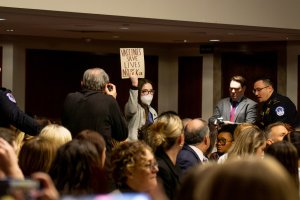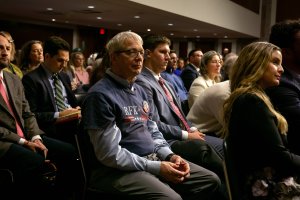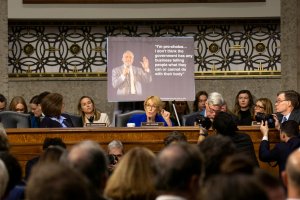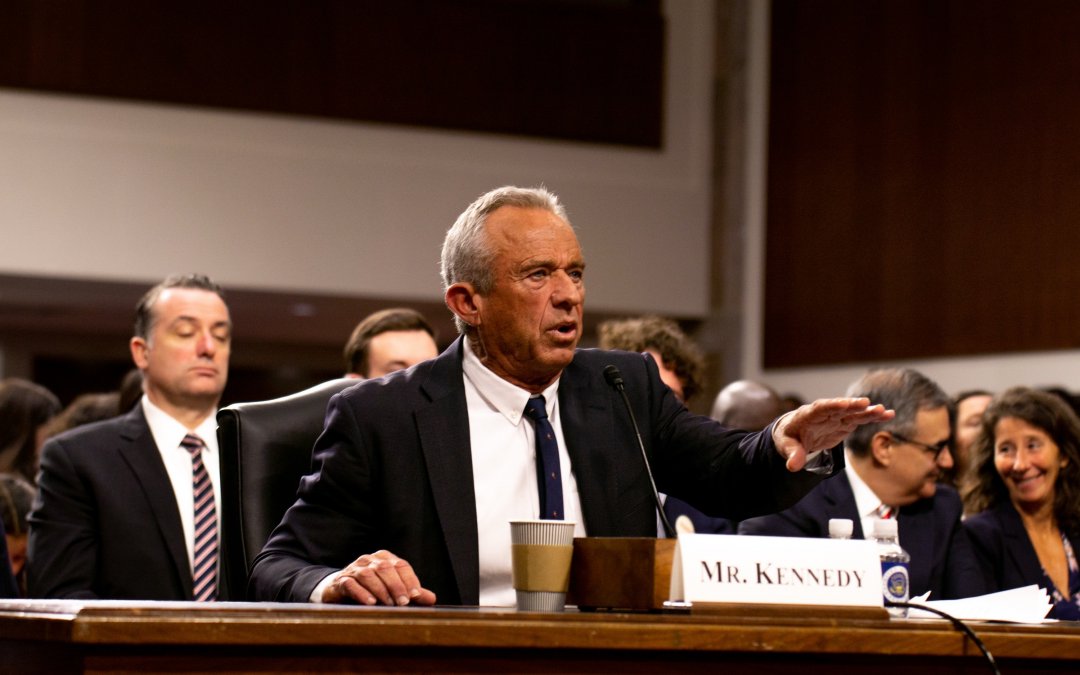WASHINGTON — When Robert F. Kennedy Jr. entered the room for his confirmation hearing Wednesday, his supporters in the audience rose to their feet, applauding and chanting “Bobby!” as doctors in the two front rows remained seated, mostly expressionless.
Police officers later removed two protesters who shouted over the proceedings. One said “You liar!” when Kennedy denied being “anti-vaccine,” and another interrupted Kennedy as he defended a 2021 petition requesting the Food and Drug Administration revoke authorization for COVID-19 vaccines.
As Kennedy sat between this divided crowd and a similarly divided Senate Finance Committee, he defended his oftentimes controversial and contradictory views on vaccines, Medicaid, abortion and other key health issues. Kennedy faces an uphill battle for Senate approval as President Donald Trump’s pick to lead the Department of Health and Human Services (HHS).
“We will create an honest, unbiased, science-driven HHS, accountable to the president, to Congress and to the American people,” he said in his opening statement. “We will reverse the chronic disease epidemic and put the nation back on the road to health.”

Police officers removed a protester at Kennedy’s confirmation hearing as the nominee defended his previous skepticism about COVID-19 vaccines. (Valerie Chu/MNS)
If confirmed, Kennedy would oversee programs like Medicare and Medicaid as well as various agencies responsible for health-related research and regulations. The former environmental lawyer said he would practice “radical transparency” and publicly release information from those agencies upon request.
Kennedy expressed support for addressing hospital staffing shortages with artificial intelligence, and he said there was a need to “experiment with public programs” like Medicaid to improve patient outcomes while providing more transparency and accountability. The nominee also praised the “entrepreneurs,” “disruptors” and “innovators” he said would be attracted to HHS under his leadership.
However, Kennedy did not directly answer questions from Sen. Mark Warner (D-Va.) on whether he supports Trump’s freezes to new federal funding and regulations, and he did not identify which agencies he would target when firing employees.
“I will commit to not firing anybody who’s doing their job,” he said, adding that he would define that standard “based on my opinion.”
Though he has falsely linked vaccines to autism, Kennedy said Wednesday that they “have a critical role in health care,” and he claimed he supports the measles and polio vaccines. The nominee also distanced himself from a measles outbreak in Samoa that killed 83 people in late 2019 — several months after he visited the region and met with anti-vaccine activists who called for an end to measles vaccinations.
Sen. Ron Wyden (D-Ore.) blasted Kennedy for writing the foreword to a 2021 book questioning the effectiveness of vaccines. That book was written by the Children’s Health Defense, a group that Kennedy chaired at the time. The organization opposes public health measures like vaccines and fluoride in drinking water.
“This is the profile of someone who chases money and influence wherever they lead, even if that may mean the tragic deaths of children and other vulnerable people,” Wyden said. “Mr. Kennedy is fond of saying he’s not making recommendations about whether parents should vaccinate their children. He’s just asking questions and giving people choices. It’s a slippery tactic to dodge any real responsibility for his words and actions.”

Gordon Evans, a retired public works engineer, attended the hearing in a shirt reading, “RFK Jr. ‘24 for President.” (Valerie Chu/MNS)
Some doctors and medical groups around the country have opposed Kennedy’s nomination because of his past statements on vaccines. The Committee to Protect Health Care started a letter opposing Kennedy’s nomination that its executive director, Dr. Rob Davidson, said has already gained more than 18,000 signatures from verified physicians.
“We feel that vaccination is a huge part of our ability to maintain the health and safety of our patients in our communities,” Davidson told Medill News Service. “So someone who has made a career of undermining vaccines, of spouting misinformation and disinformation about them, and who would be in charge of an agency that can halt vaccine availability and certainly can undermine vaccination programs just simply by having a large mouthpiece … for those reasons and others, we’re in opposition.”
Senators also pressed Kennedy on his shifting views about abortion. Kennedy expressed support for abortion rights during his presidential campaign but repeatedly said Wednesday that “every abortion is a tragedy.”
Sen. Maggie Hassan (D-N.H.) defended the effectiveness of mifepristone, a drug often used in medical abortions, and she expressed concern about Kennedy deferring to Trump and enacting policies that would reduce women’s access to health care.
“When was it that you decided to sell out the values you’ve had your whole life in order to be given power by President Trump?” Hassan said.

Sen. Maggie Hassan (D-N.H.) pointed out the difference between Kennedy’s previous support of bodily autonomy and his comments on abortion at Wednesday’s hearing. (Valerie Chu/MNS)
Kat McClanahan and Mandy Feindt attended the hearing dressed in white shirts with a message in bold red reading “Red Hill Families Need RFK Jr.” Feindt, who serves in the Army, said she attended to represent her children as well as other military service members and families harmed by the Red Hill water contamination crisis in Hawaii.
“This is not a political issue for us,” Feindt said. “We came here to say even though we’re from Hawaii and our Hawaii congressional delegation does not support RFK, we as Red-Hill-impacted families, we want someone in this position who will prioritize the health and safety of our families and our children in particular — and I know that RFK does.”
McClanahan added that their families have struggled to receive proper medical care after the harm caused when jet fuel leaked into Hawaii’s drinking water. She said that after reading about how Kennedy fought polluters who contaminated the Hudson River, she was excited for him to prioritize toxic exposures.
Brandon Anderson, another supporter at the hearing, said he gravitated toward Kennedy’s recent presidential campaign because the candidate emphasized tackling chronic disease. He said his own health challenges resulting from pharmaceutical drugs made him more wary of America’s chronic disease epidemic.
Donning a “Make America Healthy Again” cap, Anderson said he appreciated what he called Kennedy’s desire to “heal the divide” between Democrats and Republicans by focusing on public health.
“Health affects everybody,” he said. “Like Kennedy said earlier, we don’t have Republican kids or Democrat kids. They’re children of our country, you know?”

